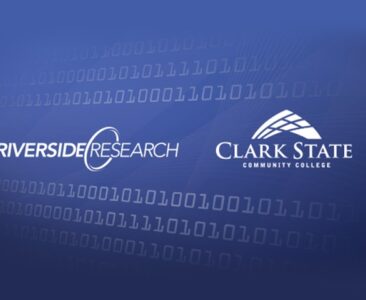Riverside Research and Clark State Community College Wrap Up Cyber Education Program
Riverside Research, a not-for-profit company and leading advisor in cyberspace security solutions, concluded the ten-week Cyber-Institutions Growing National Intellectual Talent and Experience (C-IGNITE) cyberspace education program on July 29.

C-IGNITE, developed by Riverside Research’s Cyber Center of Excellence in partnership with Clark State Community College to complement their 2014 Cyber Security Internship and Externship Program, created an enhanced educational experience by integrating classroom instruction and hands-on laboratory exercises with practical applications through professional internships. In conjunction, these programs advanced the skills of Clark State science, technology, engineering, and math (STEM) students and created a unique opportunity for educational and professional development.
The eight Clark State participants and their internship supervisors gathered at Riverside Research in Beavercreek to conclude the ten-week program. Each participant was recognized by Riverside Research’s Cyber Center of Excellence Director, Dr. Harold J. Arata III, with encouraging words commending their hard work and a certificate of completion.
During the program, participants learned about cyberspace security and information assurance principles by taking classes at Clark State taught by Professors Greg Teets and Dan Heighton and adjunct professors Cathryn Balas and Dale Rude. To accompany their Clark State courses, students also received instruction from Dr. Arata, Mr. Brian Hale, and Mr. John Moore at Riverside Research, where they received lectures on the cyberspace domain, governance, attack analysis, offensive/defensive tools and techniques, and completed hands-on laboratory exercises. To apply the concepts and skills taught at Clark State and Riverside Research, students were also assigned internship positions at several local businesses, including Riverside Research, AT&T, and LexisNexis.
C-IGNITE participants expanded on the useful information learned during the program and agreed all computer users should learn how to protect their information.
Sam Coons, Clark State Electrical Engineering student, advised computer users to be aware of interacting with others online.
“It is very easy for criminals to access and steal your information online,” said Coons. “For example, people can design emails using key technology that makes the email appear as if it is coming from your bank or your friend. Then, an included web link can take you to an insecure place online that compromises your financial information and social security number.”
Audrey McDaniel, a Clark State Post-Secondary Enrollment Options student and recent Emmanuel Christian High School graduate, and Bill Johnson, a Clark State Cyber Security and Networking student, both offered fundamental advice for computer users.
“Don’t use the same password for every online account. It might seem inconsequential, but it can make a big difference if your information gets to the wrong person,” said McDaniel.
“Keep your operating systems and anti-virus programs updated,” said Johnson. “Systems that are not current are a huge vulnerability and enable criminals to access and extract files from your computer without your knowledge.”
In addition to cyber knowledge and skills, the participants gained professional work experience and career skills. Participants cited increased time management and creative problem solving skills as unexpected results of the program. Troy Raines, a Clark State Cyber Security and Information Assurance student and former US Navy service member, especially appreciated the opportunity to gain real-world work experience with one of Dayton’s most prominent companies, LexisNexis.
As the culmination of the educational program, participants completed “Hackfest,” a three-day offensive cyberspace operations capstone event that took place at Riverside Research. The comprehensive event entailed decoding encrypted passwords, identifying system vulnerabilities, using the appropriate attacks and processes to access files, and required the participants to apply the concepts and skills learned throughout the program. The students agreed that “Hackfest” was a program highlight.
“HackFest really caught my attention and presented a challenge that was gratifying to complete,” said Johnson. “It was fun to see how hacking is actually done, and kind of addicting.”
The C-IGNITE education program furthers Riverside Research’s STEM advancement initiatives and provides an opportunity to educate and train Dayton’s future STEM workforce directly. Through this and other strategic outreach partnerships, such as CyberPatriot, Riverside Research is at the forefront of Dayton’s STEM development and positioned to nurture future technical talent nationwide. Plans are underway to continue the program annually and offer it to other area colleges and universities in the future.
Check out the Riverside Research Flickr or Facebook to see photos of the program participants and faculty in action.
About Clark State Community College
Clark State Community College serves the educational and workforce development needs of Clark, Champaign, Greene, and Logan Counties. More than 5,000 students are attending the College's three campus locations in Springfield, Beavercreek, and Bellefontaine. The College has always been a state leader in online learning and half of Clark State's students are completing courses and degree programs online. The College also operates a Performing Arts Center which houses two theatres and is the home to all of Clark County's arts presenters as well as a state-of-the-art conference center in downtown Springfield.
